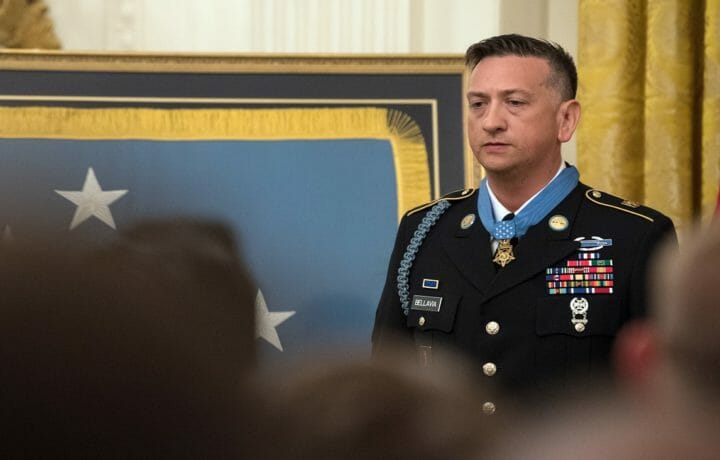There’s a very good reason why David Bellavia is the latest recipient of the Medal of Honor, our nation’s highest award for valor. He’s a genuine badass. But there’s an equally bad reason why he is the only living veteran of the Iraq War to receive “The Medal.” Our military leaders have become far too stingy with valor awards.
Professional stoics will deny it, but Napoleon’s observation that “a soldier will fight long and hard for a bit of colored ribbon” is as true today as it was in 1812.
We expect all service members to fight, kill, and even die when necessary. It is the very nature of war. But those whose actions rise above the expected ought to be recognized for those acts.
The “Global War of Terror” is embodied most in the Afghanistan War, which is almost 18 years old, and the Iraq War, which may or may not have ended in 2011. A 2018 study by RAND, a federally funded research and development center, revealed that since the September 11, 2001 terrorist attacks, more than 2.77 million men and women had deployed in support of the war efforts. Despite those massive troop numbers, the nation has awarded just 17 Medals of Honor for actions in Afghanistan, and only six for actions in Iraq.
Before Bellavia’s White House ceremony on Tuesday (followed by induction into the Pentagon’s Hall of Heroes on Wednesday), the officials responsible for deciding who does and who does not qualify for various levels of valor awards had seen fit to reward only those acts for which the recipient gave his life.
That’s a ludicrously high bar to clear, and partially the reason why former Secretary of Defense Ashton Carter ordered a valor award review in 2016. After all, the MOH requires that an act of personal bravery come at the “risk of life.” It does not, by any stretch of the imagination, require that the recipient die in said act of valor.
Following Carter’s directive, officials looked at all awards of the two levels immediately below the MOH—the Silver Star, and the co-equal Distinguished Service Cross, Navy Cross, and Air Force Cross—to ensure the department was recognizing the recipients properly.
“If we found someone who was deserving of the Medal of Honor who didn’t get it in the first go around, whatever time we’ve invested would be well worth it to make sure the individual is recognized in the manner deserved,” Marine Gen. Joseph Dunford, the outgoing chairman of the Joint Chiefs of Staff, told DoD News last year.
Bellavia is the fifth beneficiary (if that’s the right word) of that review process. Going forward, all recipients of the two highest levels of award will have their cases reviewed to determine of the initial reviews were too conservative.
Military leaders need to get past the unproductive thinking that nothing can match the heroic deeds of the men who fought the Second World War. The Greatest Generation fought perhaps the greatest conflict in human history, and has earned every bit of praise it has received. But it does not have a monopoly on heroism.
Whatever did or did not happen with the awards system during the Vietnam War must be put aside. Today’s soldiers, sailors, Marines, and airmen deserve an objective look at their actions to determine if those actions are deserving of the highest honor the nation can bestow.
They need not be judged against prior actions. Alvin York was a badass. Audie Murphy was a badass. Jon Cavaiani was a badass. (Seriously, read up on the man). But their sterling, historic examples of heroism need not mean that no one else who follows can match that valor.
David Bellavia is an American hero. There are others out there who deserve this recognition, too. It’s time to make things right. Trust me, it won’t “cheapen” the Medal of Honor to award a few more of them.



